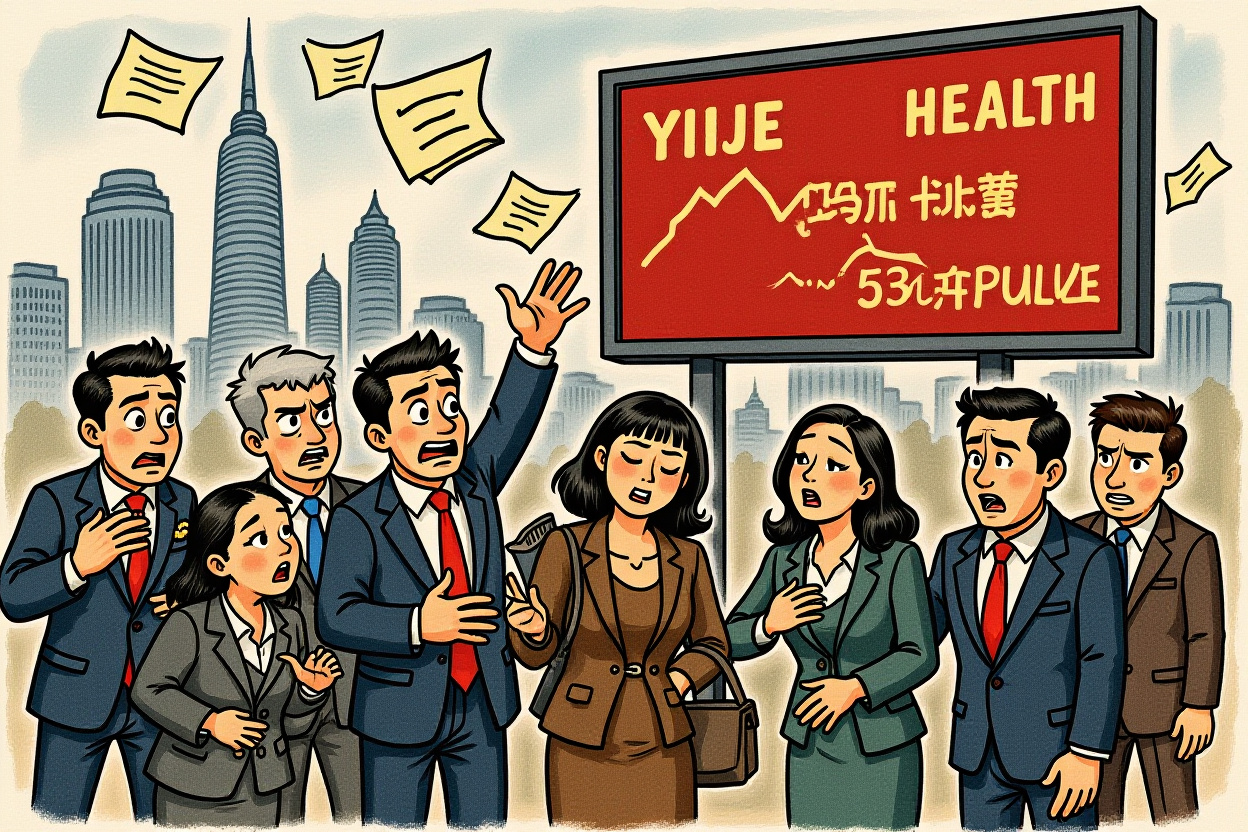The $27 Billion Rollercoaster: Anatomy of a Biotech Meltdown
Hong Kong’s biotech sector witnessed one of its most dramatic single-day reversals on September 16th as Yijie Health (药捷安康) (02617.HK) shares collapsed 53.7% after reaching astronomical valuations. The stock’s breathtaking journey from its June IPO price of HK$13.15 to a peak of HK$679.50 represented a 5,067% gain before the devastating selloff erased approximately HK$150 billion ($19.2 billion) in market capitalization. This Yijie Health stock volatility event serves as a stark reminder of the extreme risks inherent in clinical-stage biotech investing, particularly for companies without commercialized products.
The Trading Session: From Euphoria to Panic
The day began with explosive momentum as Yijie Health stock volatility reached unprecedented levels during morning trading. Shares surged over 60% to hit HK$679.50 by late morning, pushing the company’s market valuation toward HK$270 billion. This represented an extraordinary achievement for a company that had gone public just three months earlier. However, the afternoon session brought a violent reversal that shocked market participants.
At approximately 2:10 PM local time, massive sell orders began flooding the market, triggering a cascading decline that saw shares plummet to HK$165.00—a 60.24% drop from the intraday high. The stock finally settled at HK$192.00 at close, representing a net decline of 53.73% for the session and reducing the company’s market capitalization to HK$76.2 billion. The day’s trading range exceeded 120%, creating one of the most volatile sessions in Hong Kong Exchange history.
Company Response and Regulatory Implications
Yijie Health management moved quickly to address the extreme Yijie Health stock volatility with a midday announcement stating they were “not aware of any reasons” for the dramatic price and volume movements. The company confirmed that no material changes had occurred in their business operations or financial position, and that no inside information required disclosure under Hong Kong Exchange rules. This standard disclosure did little to calm nervous investors, however, as the selloff accelerated throughout the afternoon session.
Regulatory Scrutiny and Market Integrity
The Securities and Futures Commission (SFC) (证券及期货事务监察委员会) maintains strict monitoring of abnormal trading activities, particularly in cases of extreme price movements. While no official investigation has been announced, market professionals expect regulators to examine the trading patterns surrounding this event. The Hong Kong Exchange (香港交易所) has increasingly focused on maintaining orderly markets, especially for biotech stocks that have demonstrated susceptibility to speculative trading.
– Regulatory Framework: Hong Kong’s Chapter 18A biotech listing rules require specific disclosures about drug development progress
– Trading Halts: The exchange may implement temporary trading suspensions during extreme volatility
– Investor Protection: Regulators emphasize proper risk disclosure for clinical-stage companies
The Fundamental Drivers: Clinical Progress and Market Expectations
The recent Yijie Health stock volatility must be understood within the context of the company’s clinical development milestones. On September 10th, the company announced that its core product Tinengotinib (替恩戈替尼) (TT-00420) had received implied clinical trial approval from China’s National Medical Products Administration (NMPA) (国家药品监督管理局) for a Phase II study in breast cancer patients. This regulatory milestone triggered the initial phase of the massive rally that preceded the collapse.
Tinengotinib’s Therapeutic Potential
Tinengotinib represents a novel small molecule therapy targeting hormone receptor-positive (HR+), human epidermal growth factor receptor 2-negative (HER2-) breast cancer patients who have failed previous treatments. Early clinical data suggested encouraging results both as a monotherapy and in combination with fulvestrant, generating significant investor enthusiasm about its commercial potential.
– Market Size: The global market for HR+/HER2- breast cancer therapies exceeds $15 billion annually
– Unmet Need: Patients who fail standard therapies represent a significant commercial opportunity
– Development Stage: Phase II trials typically carry higher risk than later-stage studies
Financial Reality Check: Pre-Revenue Biotech Economics
Despite the dramatic Yijie Health stock volatility and market capitalization fluctuations, the company’s financial statements reveal the challenging reality of pre-revenue biotech operations. According to their August 25th interim report, Yijie Health recorded a pretax loss of RMB 123 million for the first half of 2025, though this represented an improvement from the RMB 160 million loss during the same period in 2024.
Revenue Streams and Cash Position
The company’s other income and收益 declined 65.1% from RMB 10.4 million to RMB 3.6 million, primarily due to reduced bank interest income and government subsidies. Research and development costs decreased 30.9% to RMB 98.43 million, mainly because of reduced clinical trial expenses for the TT-00420 program. Total current assets increased slightly from RMB 585 million to RMB 649 million, providing adequate runway for continued operations but hardly justifying the peak valuation of nearly HK$270 billion.
– Cash Position: HK$649 million in current assets provides approximately 2-3 years of operating runway
– Burn Rate: Current expenditure levels suggest controlled cash management
– Valuation Metrics: Peak valuation represented over 300 times projected peak sales for lead asset
Market Structure Factors: HKEX Connect and Speculative Dynamics
The inclusion of Yijie Health in the Hong Kong Stock Connect (港股通) program on September 8th played a significant role in the extreme Yijie Health stock volatility. This inclusion provided mainland Chinese investors with access to the stock through the Southbound Trading channel, dramatically increasing the potential investor base and trading liquidity. The timing of this inclusion coinciding with positive clinical trial news created a perfect storm of speculative interest.
Institutional Versus Retail Trading Patterns
Market data suggests that institutional investors largely participated in the early stages of the rally while retail investors dominated the final push to peak valuations. The subsequent selloff appears to have been triggered by profit-taking from sophisticated investors who recognized the disconnect between fundamental value and market price. This pattern is consistent with previous biotech bubbles in both Hong Kong and global markets.
– Volume Analysis: Trading volume exceeded 50 million shares during the peak volatility period
– Ownership Patterns: Retail ownership increased from 15% to over 40% during the rally
– Institutional Activity: Major funds reduced positions significantly above HK$500 per share
Risk Management Lessons for Biotech Investors
The extreme Yijie Health stock volatility provides several important lessons for investors considering positions in clinical-stage biotech companies. While the potential for massive returns exists when developmental drugs show promise, the risks are equally substantial—particularly for companies without commercialized products or predictable revenue streams.
Portfolio Construction Considerations
Professional investors typically limit biotech allocations to manageable percentages of overall portfolios and employ strict position sizing rules. Many institutional managers avoid companies in Phase II development altogether, preferring the reduced risk profile of Phase III assets or commercial-stage companies. The Yijie Health episode demonstrates why these risk management protocols exist.
– Position Sizing: Never allocate more than 1-2% of portfolio to single clinical-stage biotech
– Diversification: Spread biotech exposure across multiple companies and development stages
– Exit Strategy: Establish clear profit-taking and loss-cutting thresholds before entering positions
Looking Ahead: Regulatory and Market Implications
The spectacular rise and collapse of Yijie Health shares will likely have lasting implications for Hong Kong’s biotech sector and regulatory approach. Exchange officials may reconsider listing requirements for clinical-stage companies or implement additional circuit breakers specifically designed for extreme volatility scenarios. The event may also prompt greater scrutiny of how retail investors access complex biotech investments through programs like Stock Connect.
Industry-Wide Impact
Other Hong Kong-listed biotech companies experienced collateral damage from the Yijie Health stock volatility, with many sector peers declining 5-15% on fears of reduced investor appetite for developmental stories. This kind of sector-wide contagion is common after high-profile blowups and typically creates buying opportunities for fundamentally strong companies with proven platforms.
– Sector Valuation: Biotech sector multiples may compress temporarily due to reduced risk appetite
– IPO Pipeline: Companies considering Hong Kong listings may delay until market conditions improve
– Regulatory Response: Enhanced disclosure requirements for clinical trial announcements possible
Strategic Takeaways for Market Participants
The Yijie Health episode underscores the critical importance of fundamental research and disciplined valuation frameworks when investing in developmental biotech companies. While compelling science and regulatory milestones can drive extraordinary returns, investors must maintain perspective about the probabilistic nature of drug development and the substantial risks involved.
Market professionals should monitor upcoming catalysts including Phase II data readouts for Tinengotinib, which will provide the next fundamental test for the company’s valuation. Until then, expect continued Yijie Health stock volatility as the market digests the aftermath of this spectacular rally and correction. Investors would be wise to focus on companies with diversified pipelines, proven management teams, and manageable cash burn rates rather than chasing extreme momentum stories.
For ongoing coverage of Chinese biotech developments and market analysis, subscribe to our professional research service and download our special report on evaluating clinical-stage pharmaceutical investments.




